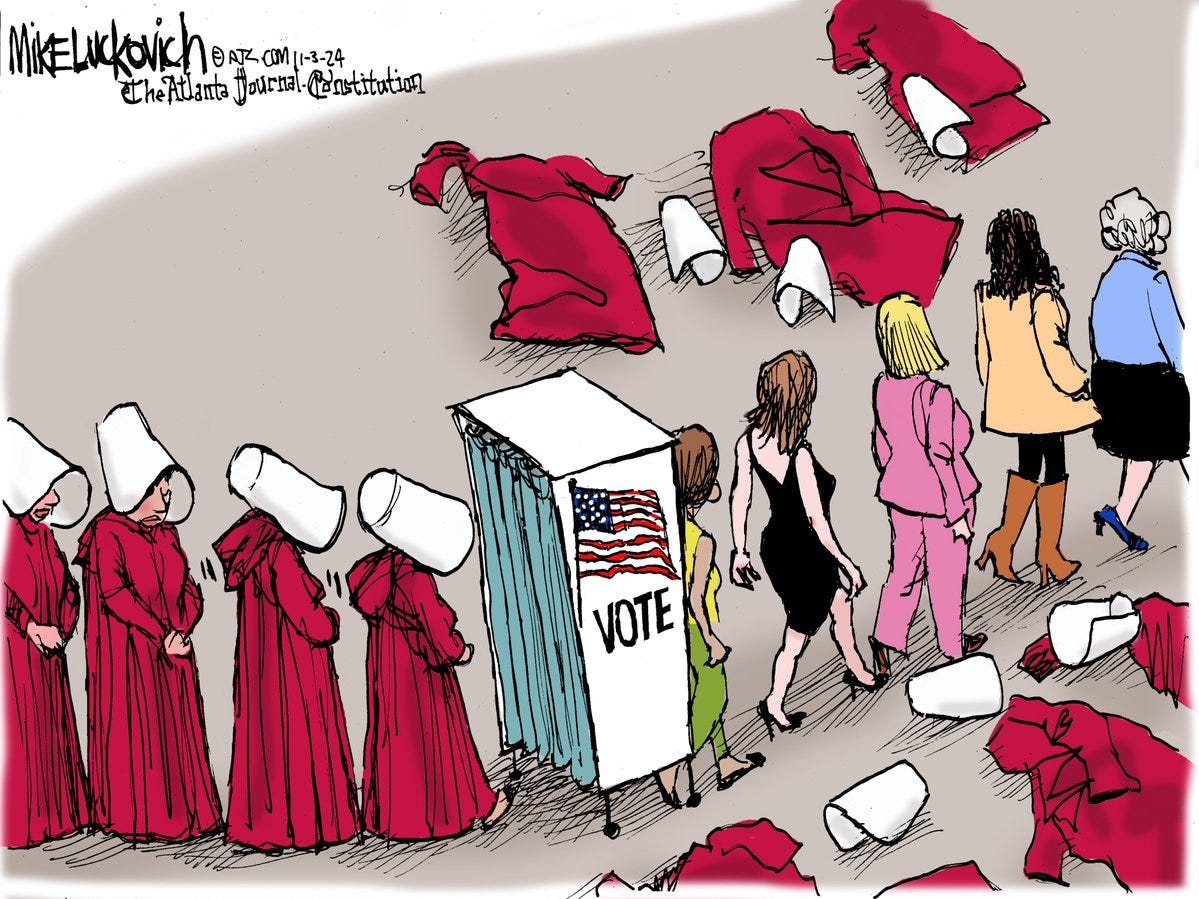For what it’s worth, I think Kamala Harris is going to win the presidency. Thanks in part to Donald Trump’s misogyny and the racism on display at the MAGA neo-Nazi rally at Madison Square Garden last month, women and Puerto Ricans are going to provide the decisive margin of victory.
But that would be only a partial victory, even if Democrats also win control of the House, but fail to hold on to the Senate. And I’m afraid that is the most likely outcome.
But anything is possible, and there’s still a chance that Jon Tester can defeat his Republican opponent in Montana; perhaps the independent Dan Osborne can win in Nebraska; and there’s even hope
that the loathsome Ted Cruz will lose his re-election bid against Colin Allred.
In a NYT op-ed, Jonathan Alter lays out the best case scenerio. He provides a long list of possible changes; I’m going to highlight just a few that stand out to me.
Call it a political upset for the ages or just a pipe dream, but Democrats should put aside their anxiety for a moment and imagine this scenario next week: Kamala Harris wins the presidency, Democrats take the House and they beat the odds by holding most of their Senate seats and pulling off at least one surprise victory (Texas? Florida? Nebraska?) that lets them maintain power in that chamber.
Unlikely, you say, and you’re probably right. A more probable outcome is divided government, which would bring a combination of gridlock and incremental change.
But let’s assume we all get to live on Fantasy Island for a couple of years before the 2026 midterms. Top Senate Democrats tell me they’re already thinking about what they could do with a congressional majority, and Democratic voters should do the same. . .
At a minimum, a Democratic sweep would protect President Biden’s legacy of investments in electric vehicle infrastructure, more affordable Obamacare premiums, kitchen table initiatives (mostly in the form of tax subsidies for the middle class), gun safety and clean energy. At the same time, Americans could reasonably anticipate new progress on abortion rights, voting rights, immigration, child tax credits, help for small business, affordable housing, paid family leave, home health care under Medicare, tax fairness and the appointment of liberal judges. . .
[Senate Majority Leader Chuck] Schumer made news at the Democratic convention in Chicago when he said that if his party holds the Senate, he would move to suspend the filibuster to approve landmark legislation on voting rights and free and fair elections.
The Freedom to Vote Act is cosponsored by nearly every Senate Democrat in this Congress and probably the next. In combination with the John R. Lewis Voting Rights Advancement Act, it would revive the landmark 1965 Voting Rights Act and add far-reaching new standards for federal elections. The Lewis Act passed in the House when Democrats controlled it. It’s not too much to say that the “new birth of freedom” (to use Lincoln’s words) contained in the bill would transform federal elections. . .
Imagine securing reproductive rights nationwide, moving the conversation from protecting democracy to strengthening it, cutting child poverty nearly in half and finally making billionaires pay their fair share of income taxes. The challenge of reconciling dreams and reality would remain, of course. But instead of a prevent-defense, Democrats would then be inside the red team’s red zone, poised to put real points on the board.
Much of this, as Alter notes, may prove beyond the capability of our fractured political system. But it’s at least on Harris’s “to-do list,” as she put it in her closing argument on the grounds of the Ellipse, where Trump roused a mob on Jan. 6, 2021 to try to overturn the election.
By contrast, Trump would usher in a starkly reactionary administration, an authoritarian approach to governing and a commitment to destroying the Western alliance and bending the knee to Vladimir Putin.
Meanwhile, Trump himself would spend whatever time he has left to occupy the Oval Office focusing on his “enemies list.”
Here’s a neat summary of his ambitions by the always insightful Paul Glastris, the editor of The Washington Monthly.
Journalists and voters who say Trump’s campaign promises and threats are empty rhetoric are deluding themselves
In a second term, Donald Trump has vowed to jail his political rivals, muzzle the press, gut the civil service, deport millions of undocumented immigrants, use federal agencies to reward corporations friendly to him and punish those deemed unfriendly, eliminate taxes on Social Security (resulting in severe benefits cuts), weaken the Federal Reserve’s independence so he can cut interest rates at will (which would likely spook investors and cause capital flight), and build a wall of tariffs around the U.S. economy (which could spark a trade war and possibly a global recession). The press has dutifully reported on these alarming campaign promises, sometimes quoting experts explaining their potentially disastrous consequences.
Most of these stories, however, leave room for the idea—via cleanup-in-aisle-eight quotes from Trump-friendly Republicans or shrewd-sounding assurances from the journalists themselves—that what the former president promises on the campaign trail isn’t what he’ll do in office. For instance, in an otherwise fine column on the potentially catastrophic results of some of Trump’s stated economic plans, The Washington Post’s Eduardo Porter dismisses the seriousness of others:
Many of the proposals voiced by Donald Trump on the campaign trail have been cast aside as probably meaningless. The offer to make interest payments on car loans tax deductible, like the promises to exempt tips and Social Security payments from taxes or restore the state and local tax deductions, can be read as empty electoral pandering to Americans with car loans, restaurant workers, the elderly — you name it.
Porter is right that Trump has expressed more passion about tariffs than FICA taxes. Yet by saying that much of his economic agenda can be “cast aside” as “empty electoral pandering,” Porter is making a mistake that other journalists and millions of voters fall prey to, which could have disastrous electoral consequences.
The assumption that presidential candidates routinely make campaign promises they don’t intend to keep is widely held and wrong—about victorious nominees generally, and Trump in particular. . . Trump, like previous presidents, did govern mainly on his campaign agenda. You can see that in the “Trump-O-Meter” published by PolitiFact, which connected more than a hundred of his 2016 promises to his actions as president. It’s also clear from the Washington Monthly’s “Presidential Accomplishments Index,” published this summer, which tracked 149 significant achievements of the Trump and Joe Biden administrations across 21 policy areas.
The PolitiFact and Monthly data show that Trump didn’t get as much of his agenda implemented as did either Obama or Biden. But our reporting revealed that was primarily due to Trump’s incompetence, inexperience, and a staff with sense enough to slow walk his most lunatic policy directives. Two of those three conditions won’t exist in a second Trump term. And a second term could also bring with it a Republican-controlled Senate and a House still in GOP hands, both more beholden to Trump than during his first term.
So, there’s no reason to assume a second-term Trump won’t try to make good on all or nearly all of the radical, dangerous, fascistic promises he’s making now. And he’s likely to be more successful in getting his way than before.
Trump only wins when Americans don’t believe he’s serious, or as the old saying goes, take him seriously but not literally.
Michael Podhorzer, the political analyst, has observed, that Kamala Harris’ strongest and softest supporters equally believe that Trump’s agenda is dangerous. Where they differ is that strong supporters “are much more likely to believe that Trump will follow through on his agenda,” while the soft supporters think he’s mostly just talk. The soft supporters, Podhorzer says in an email, are also more likely to sit out the election because they don’t think Trump will act on what he’s saying, or at least not in ways that will affect them.
That’s the promise and the peril that Americans face. Like Tom Nichols of The Atlantic, I still have faith that we will make the right choice.
‘
Watching the sunset in my yard, and thinking about how much the world might change in the next week. I want to believe that we’re a decent nation and that we’re going to do right.
6:48 PM · Nov 1, 2024·231.8K Views






